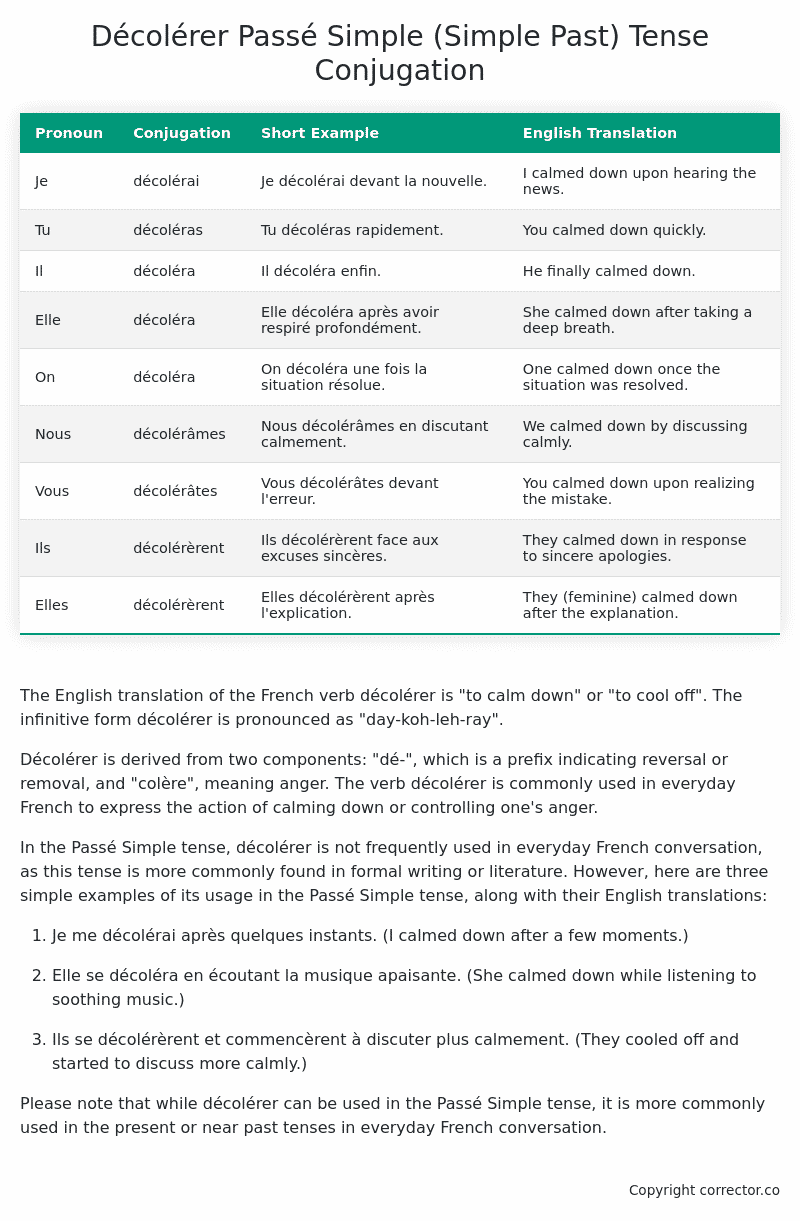Passé Simple (Simple Past) Tense Conjugation of the French Verb décolérer
Introduction to the verb décolérer
The English translation of the French verb décolérer is “to calm down” or “to cool off”. The infinitive form décolérer is pronounced as “day-koh-leh-ray”.
Décolérer is derived from two components: “dé-“, which is a prefix indicating reversal or removal, and “colère”, meaning anger. The verb décolérer is commonly used in everyday French to express the action of calming down or controlling one’s anger.
In the Passé Simple tense, décolérer is not frequently used in everyday French conversation, as this tense is more commonly found in formal writing or literature. However, here are three simple examples of its usage in the Passé Simple tense, along with their English translations:
-
Je me décolérai après quelques instants.
(I calmed down after a few moments.) -
Elle se décoléra en écoutant la musique apaisante.
(She calmed down while listening to soothing music.) -
Ils se décolérèrent et commencèrent à discuter plus calmement.
(They cooled off and started to discuss more calmly.)
Please note that while décolérer can be used in the Passé Simple tense, it is more commonly used in the present or near past tenses in everyday French conversation.
Table of the Passé Simple (Simple Past) Tense Conjugation of décolérer
| Pronoun | Conjugation | Short Example | English Translation |
|---|---|---|---|
| Je | décolérai | Je décolérai devant la nouvelle. | I calmed down upon hearing the news. |
| Tu | décoléras | Tu décoléras rapidement. | You calmed down quickly. |
| Il | décoléra | Il décoléra enfin. | He finally calmed down. |
| Elle | décoléra | Elle décoléra après avoir respiré profondément. | She calmed down after taking a deep breath. |
| On | décoléra | On décoléra une fois la situation résolue. | One calmed down once the situation was resolved. |
| Nous | décolérâmes | Nous décolérâmes en discutant calmement. | We calmed down by discussing calmly. |
| Vous | décolérâtes | Vous décolérâtes devant l’erreur. | You calmed down upon realizing the mistake. |
| Ils | décolérèrent | Ils décolérèrent face aux excuses sincères. | They calmed down in response to sincere apologies. |
| Elles | décolérèrent | Elles décolérèrent après l’explication. | They (feminine) calmed down after the explanation. |
Other Conjugations for Décolérer.
Le Present (Present Tense) Conjugation of the French Verb décolérer
Imparfait (Imperfect) Tense Conjugation of the French Verb décolérer
Passé Simple (Simple Past) Tense Conjugation of the French Verb décolérer (You’re reading it right now!)
Passé Composé (Present Perfect) Tense Conjugation of the French Verb décolérer
Futur Simple (Simple Future) Tense Conjugation of the French Verb décolérer
Futur Proche (Near Future) Tense Conjugation of the French Verb décolérer
Plus-que-parfait (Pluperfect) Tense Conjugation of the French Verb décolérer
Passé Antérieur (Past Anterior) Tense Conjugation of the French Verb décolérer
Futur Antérieur (Future Anterior) Tense Conjugation of the French Verb décolérer
Subjonctif Présent (Subjunctive Present) Tense Conjugation of the French Verb décolérer
Subjonctif Passé (Subjunctive Past) Tense Conjugation of the French Verb décolérer
Subjonctif Imparfait (Subjunctive Imperfect) Tense Conjugation of the French Verb décolérer
Subjonctif Plus-que-parfait (Subjunctive Pluperfect) Tense Conjugation of the French Verb décolérer
Conditionnel Présent (Conditional Present) Tense Conjugation of the French Verb décolérer
Conditionnel Passé (Conditional Past) Tense Conjugation of the French Verb décolérer
Conditionnel Passé II (Conditional Past II) Tense Conjugation of the French Verb décolérer
L’impératif Présent (Imperative Present) Tense Conjugation of the French Verb décolérer
L’impératif Passé (Imperative Past) Tense Conjugation of the French Verb décolérer
L’infinitif Présent (Infinitive Present) Tense Conjugation of the French Verb décolérer
L’infinitif Passé (Infinitive Past) Tense Conjugation of the French Verb décolérer
Le Participe Présent (Present Participle) Tense Conjugation of the French Verb décolérer
Le Participe Passé (Past Participle) Tense Conjugation of the French Verb décolérer
Struggling with French verbs or the language in general? Why not use our free French Grammar Checker – no registration required!
Get a FREE Download Study Sheet of this Conjugation 🔥
Simply right click the image below, click “save image” and get your free reference for the décolérer Passé Simple tense conjugation!

Décolérer – About the French Passé Simple (Simple Past) Tense
Formation
Usage
Narration
Historical Context
Interactions with other tenses
Passé Composé
Imparfait
Conditional and Subjunctive
Summary
I hope you enjoyed this article on the verb décolérer. Still in a learning mood? Check out another TOTALLY random French verb conjugation!


